
HIPAA Compliance for Healthcare App Developers: A Complete Guide
HIPAA Compliance for Healthcare App Developers: A Complete Guide
Build trust and protect patient data: A complete guide for healthcare app developers on achieving HIPAA compliance, avoiding fines, and delivering secure digital health solutions.
What is HIPAA and Why Does It Matter for App Developers?
HIPAA is a U.S. federal law designed to safeguard sensitive patient health data. It applies to covered entities (e.g., healthcare providers, insurers) and their business associates — including healthcare app developers who create or manage apps that handle Protected Health Information (PHI).
If your app processes, stores, or transmits PHI on behalf of a covered entity, you are responsible for HIPAA compliance.
HIPAA consists of several key rules:
- Privacy Rule: Controls how PHI can be used and disclosed.
- Security Rule: Defines technical, physical, and administrative safeguards to protect PHI.
- Breach Notification Rule: Requires entities to notify affected individuals and regulators in case of data breaches.
Why HIPAA Compliance is a Must for Healthcare Apps
The healthcare industry is undergoing a digital transformation. From telehealth platforms to remote patient monitoring tools, healthcare apps are reshaping how care is delivered. But as apps collect, process, and store sensitive health data, the risks to patient privacy and data security multiply.
For healthcare app developers, ensuring HIPAA compliance isn’t just about checking a legal box — it’s about protecting patients, preserving trust, and safeguarding your business from regulatory penalties. This guide explains what HIPAA means for healthcare app development, how to build compliance into your app’s DNA, and the steps to avoid costly mistakes.
Who Needs to Think About HIPAA Compliance?
If you’re developing or managing an app that deals with Protected Health Information (PHI) — data that relates to an individual’s health status, treatment, or payment for care — you may be legally responsible for HIPAA compliance.
Examples of apps likely subject to HIPAA:
- Telemedicine and virtual care platforms
- Patient scheduling and appointment apps
- Prescription refill and management tools
- EHR-connected apps
- Remote monitoring apps (e.g., glucose monitoring, heart rate tracking linked to care providers)
Apps that only track general wellness data (e.g., calorie counters, fitness trackers) might not fall under HIPAA. But remember: the moment your app starts handling PHI — even via integrations — HIPAA applies.
Key HIPAA Obligations for Healthcare App Developers
When your app handles PHI, it must:
- Ensure confidentiality, integrity, and availability of health data
- Protect against unauthorized access or disclosures
- Detect and respond to potential security incidents
- Sign Business Associate Agreements (BAAs) with partners and vendors that handle PHI on your behalf
Tip: HIPAA compliance starts at the design phase. Retrofitting security after development is riskier and more expensive.
Building a HIPAA-Compliant Healthcare App: What Developers Need to Do
1️⃣ Secure Architecture Design
- Apply privacy-by-design principles
- Use segmented data storage
- Choose HIPAA-compliant infrastructure (e.g., AWS, Azure, Google Cloud with signed BAAs)
2️⃣ Strong Authentication and Access Controls
- Implement role-based access
- Require multi-factor authentication (MFA)
- Regularly review and update access privileges
3️⃣ Encryption
- Encrypt PHI in transit (TLS/SSL) and at rest (AES-256)
- Secure APIs and integrations
- Use secure key management practices
4️⃣ Audit Trails and Logging
- Record access logs
- Monitor and alert for suspicious activity
- Review logs regularly
5️⃣ Data Minimization and Retention
- Collect only necessary PHI
- Enforce data retention policies
6️⃣ Incident Response Planning
- Create a breach detection and response plan
- Test and update the plan regularly
7️⃣ Vendor and Third-Party Risk Management
- Vet vendors for HIPAA compliance
- Sign Business Associate Agreements (BAAs)
- Monitor vendor compliance
Common Pitfalls in HIPAA Compliance for App Developers — And How to Avoid Them
- Assuming HIPAA doesn’t apply — If you handle PHI for a covered entity, HIPAA applies. Consult legal experts early.
- Storing PHI without proper encryption — Always encrypt PHI at rest and in transit.
- Using non-compliant third-party services — Ensure vendors are HIPAA-compliant with BAAs.
- No breach response plan — Document and test a breach plan.
- Poor documentation — Maintain clear compliance records.
Benefits of HIPAA Compliance for App Developers
- Competitive advantage: Providers prefer compliant vendors.
- User trust: Patients choose apps that protect privacy.
- Reduced legal risk: Avoid penalties and lawsuits.
- Scalability: Build secure apps that scale safely.
Working with HIPAA Compliance Experts
Navigating HIPAA as an app developer can be complex. A compliance consultant or security partner can help you:
- Conduct risk assessments
- Document security policies
- Train your team
- Stay updated on regulations
Pro tip: Consider ongoing compliance monitoring rather than a one-time audit.
The Consequences of Non-Compliance
Non-compliance can lead to:
- Fines up to $50,000 per violation
- Annual penalties over $1.5 million
- Civil or criminal charges
- Reputational damage
Conclusion: Secure Apps, Stronger Healthcare
HIPAA compliance is your opportunity to lead with security, privacy, and integrity. By embedding safeguards into your app’s design, you protect patients and build long-term relationships with providers.
🚀 Take the first step today. Contact our team for a HIPAA readiness assessment and let’s make your app secure by design.




